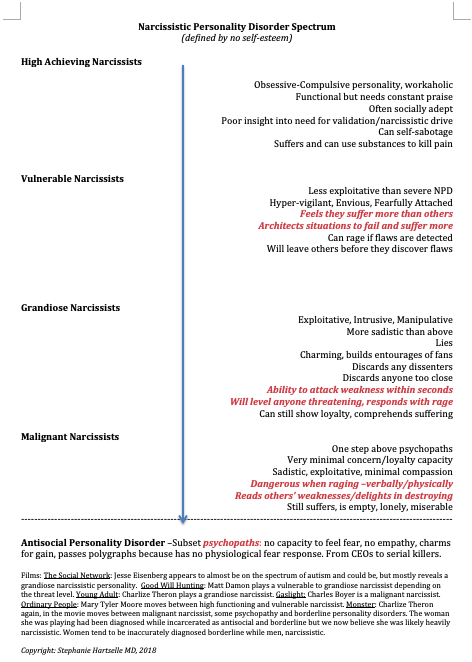Copyright 2018 Stephanie Hartselle, MD
Personality Disorders vs Other Psychiatric Disorders
Personality is formed over time. It is composed of strengths, weaknesses and our best attempt at coping with what was formative in our early years. Each of us has had varying degrees of problems with which to deal. We carry genetic loading from our families for both positive and challenging traits. It is this mix and our temperament combined with external influences (friends, environment, resource scarcity vs. abundance) that produces the farily stable force that is our personality.
When personalities are “disordered”, it means that survival tactics used in early years while once useful, persist into adulthood and become incompatible with adult functioning and the formation of stable relationships (with self and others).
In learning about the personality disorders, we often panic, believing we might have been undiagnosed all these years, but typically, it is very normal to have aspects of our personalities that when stressed and look disordered. What differentiates those with a diagnosable personality disorder is the unrelenting, inescapable nature of how much interactions cause constant suffering. It was thought that personality was intractable and unmovable. We now know that people can recover from these survival patterns and develop healthy, lasting relationships when treated.
Psychiatric Disorders (non-personality) –PTSD, Anxiety Disorders, Depression, Bipolar Disorder, etc.
These are usually episodic. They can be triggered by an event (trauma) but are defined by an onset that is not part of personality but can be thought of more as a singular or repetitive illness that impairs an individual. They are often less lengthy and difficult to treat but can certainly cause immense pain. The difference is that these are not part of a person’s personality but have a discrete onset, and sometimes recurrence.
Psychiatry’s History
Shamefully, it has, like most other interpretations of disease, been interpreted by the dominating paradigm. Women, the LGBTQQI population, people of color and anyone marginalized by the system have been relegated to some of the most degrading descriptions, misdiagnosis and mistreatment by this specialty. The study of psychiatry has been historically dominated by misogynistic, narcissistic, privileged, white men. Our job as contemporary doctors is to do our best at highlighting where we’ve gone wrong, how we could be continuing to perpetuate the paradigm and to recognize the strong, emerging evidence that all of these disorders are treatable. Psychiatric illness is based in one of our largest and most complicated organs, the brain. Dysfunction is nearly always complicated by genetics, environmental factors, and individual adaptive strengths. This is how we conceptualize every other organ-based disease. It should be no different with this specialty.




